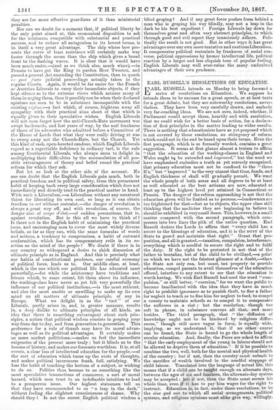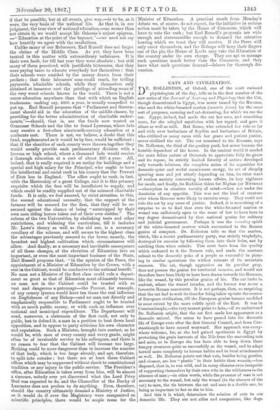EARL RUSSELL'S RESOLUTIONS ON EDUCATION.
Ei.ARL RUSSELL intends on Monday to bring forward a series of resolutions on Education. We suppose he intends them to be excuses for a great speech, or at best texts for a great debate, but they are noteworthy resolutions, never- theless. They have been very carefully drawn, and embody very far-reaching ideas. We are not sure, indeed, whether, if Parliament would accept them, heartily and with resolution, that we could wish for a better basis of action, for a declara- tion of first principles in the matter leading to wider results. There is nothing that educationists have as yet proposed which is not covered by these resolutions, no stringency of reform which could not in the end be based upon their terms. Even the first paragraph, which is so formally worded, contains a great suggestion. It seems at first glance almost a truism to affirm "that the education of the working-classes in England and Wales ought tq be extended and improved," but the word we have emphasized embodies a truth as yet scarcely recognized, that primary education must not be confined to the " three R's," but " improved " to the very utmost.that time, funds, and English thickness of skull will gradually permit. We want the whole people of both sexes and all degrees to be at least as well educated as the best artisans are now, educated at least up to the highest level yet attained in Connecticut or Prussia. The danger of the reform approaching is not that the education given will be limited as to persons,—landowners are too frightened for that—but as to objects, the upper class still thinking that the medicine they are beginning to believe in should be exhibited in verysmall doses. This,however,is a small matter compared• with the second paragraph, which com- presses into two lines the pith of the entire question. Earl Russell desires the Lords to affirm that "very child has a RIGHT to the blessings of education, and it is the DUTY of the State to guard and maintain that right." Grant that pro-. position, and all is granted,—taxation, compulsion, interference, everything which is needful to secure the right and to fulfil the duty. If the -right to be protected is not that of the father to brutalize, but of the child to be civilized,—a point on which we have not the faintest glimmer of a doubt,—then the State not only can, bat must, tax property to provide education, compel parents to avail themselves of the education offered, interfere to any extent to see that the education is worth having. We wish Earl Russell had used the word "com- pulsion," or still better, " coercion," for we want the public to become familiarized with the idea that they have tis much right to pfohibit ignorance as to punish theft, to fine a father for neglect to teach.as to fine him for neglect to feed, to compel a county to maintain schools as to compel it to compensate the sufferers in a riot ; but the resolution, though too soft in phrase, in substance conveys all that, and more besides. The third paragraph, that " the diffusion of knowledge ought not to be hindered by religions differ- ences," though still more vague in form, is equally wide, implying, as we understand it, that if no other course can be found, the State is bound to go the whole length of secular education. And, finally, the Peers are asked to affirm " that the early employment of the young in labour should not be allowed to deprive them of education." If it be possible to combine the two, well, both for the mental and physical health of the country ; but if not, then the country must submit to the )sacrifice of wealth involved in the needful stoppage of child labour. Translated into the language of actual life, this means that if a child can be taught enough on alternate days, between the ages of six and fourteen, the alternate-day system may be accepted ; but if not, then the State must secure his whole time, even if it has to pay him wages for the right to instruct. Education is, in fact, under these resolutions, to be the sine qud non to which all social arrangements, political systems, and religious opinions must alike give way, willingly, if that be possible, but at all events, give way,—is to-be, as it were, the very basis of the national life. As that is, in our judgment, the true view of national education,—as, sooner than not obtain it, we ;would accept Mr. Osborne's unjust epigram, —"Education at the point of the bayonet,"—we need not say how heartily we agree with the resolutions.
Unlike many of our Reformers, Earl Russell does not forget the claims of the Middle Class. As yet, they have been treated in this matter with extraordinary unfairness. It is their own fault, for till last year they were absolute ; but still many of them perceived, with justifiable bitterness, that they were paying taxes to educate everybody but themselves ; that their schools were unaided by the money drawn from their pockets ; that their labourers' sons could reach, for trifling payments, admirable schools, while they themselves only obtained at immense cost the privilege of attending some of the very worst schools known in the world. There is not a worse education anywhere than that with which an English tradesman, making say, 4001. a year, is usually compelled to put up. Earl Russell proposes that " Parliament and Govern- ment should aid in the education of the middle classes, by providing for the better administration of charitable endow- ments,"—should, that is, use the funds now wasted on Grammar Schools and the like to found Lyceums, where lads may receive a first-class nineteenth-century education at a moderate cost. There is not, we believe, a doubt that this fund, supplemented as it would be by fees, would be sufficient ; that if the charities of each county were thrown together they would usually provide each parliamentary division with a lyceum or high school, where a thousand lads would receive a thorough education at a cost of about 201. a year. All, indeed, that is really required is an outlay for buildings and a special and high salary for the Principal, who ought to have the intellectual and social rank in his county that the Provost of Eton has in England.- The office ought to rank, in fact, with the Mastership of a great College, and it is this primary requisite which the fees will be insufficient to supply, and which could be readily supplied out of the misused charitable funds. It is only, we feel assured; by strict attention to this, the second educational necessity, that the support of the farmers will be secured for the first, that they will be re- assured against the chance of being " outstripped by their own men riding horses taken out of their own stables." The reform of the two Universities, by abolishing tests and other restrictions, and widening the curriculum, till it includes Mr. Lowe's theory as well as the old one, is a necessary corollary of the scheme, and will secure to the highest class the advantages previously assured to the lower, namely, the broadest and highest cultivation which circumstances will allow. And Nally, as a necessary and inevitable consequence of all these changes, of the elevation of Education into an important, or even the most important business of the State, Earl Russell proposes that, " in the opinion of the Peers, the appointment of a Minister of Education by the Crown, with a seat is the Cabinet, would be conducive to the national benefit." No man not a Minister of the first class could rule a depart- ment so great as that of Education must ultimately become, no man not in the, Cabinet could be trusted with so vast and dangerous xpatronage—the Provost, for example, of any county lyceum would have ten times the real influence on Englishmen of any Bishop—and no man not directly and emphatically responsible to Parliament ought to be trusted with so much public money, or with such an influence over national and municipal expenditure. The Department will need, moreover, a statesman of the first Tank, not only to guide, but to defend it, a man in a position to beat down local opposition, and to oppose to party criticism his own character and reputation. Such a Minister, brought into contact, as he would be, with men of every county and every grade, might often be of invaluable service to his colleagues, and there is no reason to fear that the Cabinet will become too large. Nothing could be more dangerous than to increase the number of that body, which is too large already, and apt, therefore, to split into coteries ; but there are at least three Cabinet offices which may be suppressed without shock to constitutional tradition or any injury to the public service. The President's office, after Education is taken away from him, will be almost a sinecure, nobody ever yet discovered what the Lord Privy Seal-was expected to do, and the Chancellor of the Duchy of Lancaster does not profess to do anything. Even, therefore, should the country ultimately demand a Ministry of Justice, as it would do if ever the Magistracy were reorganized on scientific principles, there would be ample room for the Minister of Education. A practical result from Monday's debate we, of course, do not expect, for the initiative in serious action must be taken by the House of CoMmons, which will have to vote the cash ; but Earl Russell's proposals are wide enough and statesmanlike enough to demand the attentive hearing which we trust they will receive. If the Peers will only exert themselves, and the Bishops will keep their fingers out of the pie, the House of Lords may take the Education of the country under its own charge. They are apt to manage such questions much better than the Commons, and they have what such question's demand—leisure for thorough dis- cussion.



































 Previous page
Previous page